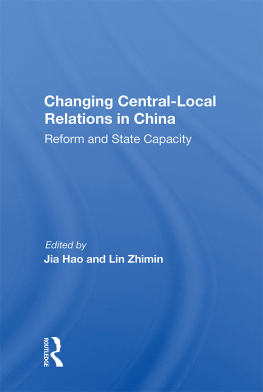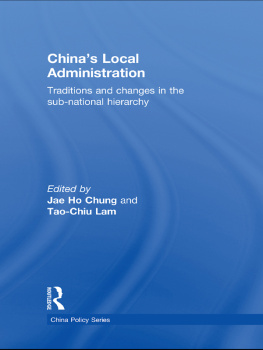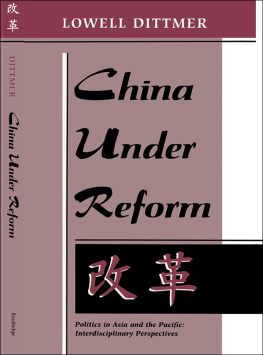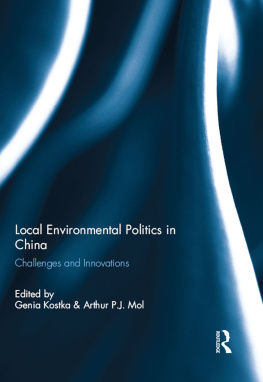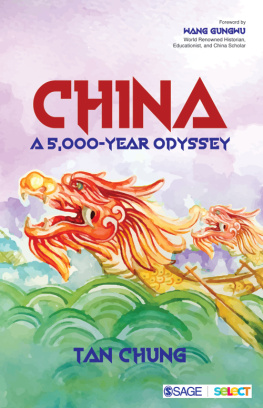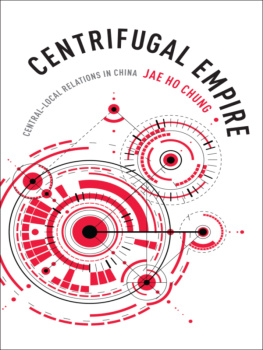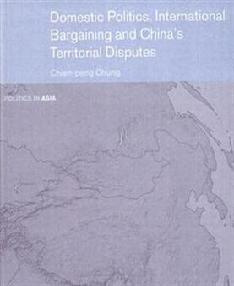Changing Central-Local Relations in China
Changing Central-Local Relations in China
Reform and State Capacity
Edited by
Jia Hao and Lin Zhimin
First published 1994 by Westview Press, Inc.
Published 2018 by Routledge
52 Vanderbilt Avenue, New York, NY 10017
2 Park Square, Milton Park, Abingdon, Oxon OX14 4RN
Routledge is an imprint of the Taylor & Francis Group, an informa business
Copyright 1994 Taylor & Francis
All rights reserved. No part of this book may be reprinted or reproduced or utilised in any form or by any electronic, mechanical, or other means, now known or hereafter invented, including photocopying and recording, or in any information storage or retrieval system, without permission in writing from the publishers.
Notice:
Product or corporate names may be trademarks or registered trademarks, and are used only for identification and explanation without intent to infringe.
Library of Congress Cataloging-in-Publication Data
Changing central-local relations in China: reform and state capacity
/ edited by Jia Hao and Lin Zhimin.
p. cm.
Includes bibliographical references and index.
ISBN 0-8133-1898-X
1. Central-local government relationsChina. 2. ChinaPolitics
and government1976 . I. Jia, Hao. II. Lin, Zhimin.
JQ1506.S8C43 1994
354.5108098dc20 93-24882
CIP
ISBN 13: 978-0-367-00890-1 (hbk)
Contents
, Jia Hao and Lin Zhimin
, Zhao Suisheng
, Jia Hao and Wang Mingxia
, Gong Ting and Chen Feng
, Wang Shaoguang
, Luo Xiaopeng
, Xiao Geng
, Zhang Amei and Zou Gang
, Huo Shitao
, Peter Tsan-yin Cheung
, Lin Zhimin
Guide
In late 1990, at the initiative of the association of Chinese Scholars of Political Science and International Studies, Inc. (CSPSIS), a group of Chinese scholars decided to work together to find a research topic that could best capture the changing nature of the Chinese polity in the wake of its decade-long reform process. The participants were either directly involved in or had followed China's reform process for years while lately engaged in studying, teaching, and research in the United States. Before long we came to the conclusion that no single subject would serve our purpose better than the enormous changes taking place in the nation's central-local relations. A research project was thus launched by CSPSIS and for almost three years it has involved a transcontinental collaboration. This volume represents the outcome of our collective endeavor.
While awaiting both academic critique and further testing of China's evolving situation, as well as reiterating "the usual disclaimer" that the editors and contributors alone are responsible for the views, interpretations, and of course errors in the work, several acknowledgments are in order.
This study would not have been possible without the overall support of the Rockefeller Foundation to CSPSIS in general, and a 1991-1992 research grant by the Chiang Ching-Kuo Foundation for International Scholarly Exchanges (USA) in particular. I especially wish to thank the Rockefeller Foundation's Senior Vice President Kenneth Prewitt, who over the years has provided us with enormous support and personal understanding. His assistant, Carol J. Tyler, had made the grant administration a most enjoyable experience. Special thanks also go to Dr. Hungdah Chiu and Dr. Hsing-wei Lee of the Chiang Ching-Kuo Foundation for their valuable support and consistent cooperation during the process.
I also wish to acknowledge three members of the CSPSIS Advisory Board: Professor Arend Lijphart at UC San Diego and Professors Andrew G. Walder and Ezra F. Vogel at Harvard, both for their scholarship on the subject and their specific advice on our research. Among my personal best memories of serving as the CSPSIS president between 1990 and 1992 was the chance to work with each of them.
We were extremely fortunate to get strong editing assistance from Madelyn C. Ross, whose experience as the former editor of the China Business Review, commitment to the work, and knowledge of China and the Chinese language considerably eased the process. Our gratitude also goes to Xiangdong Ma, a fellow Chinese scholar and my apartment neighbor in a suburb of Washington, D.C., who provided us with technical support in typesetting the whole volume.
We are grateful to Westview Press as well, which has made this publication possible. Special thanks go to Alison Auch for her support and cooperation. Julie Seko's assistance helped us typeset the volume.
Finally, this volume should most appropriately be dedicated to our organization, the association of Chinese Scholars of Political Science and International Studies, Inc. Established in 1986, it has for many years actively served Chinese scholars studying political science and international relations in the United States. The society's accomplishments contribute both to the disciplinary development and the organization of overseas Chinese scholars in the social sciences. It is thus worth mentioning the consistent support given to the project by CSPSIS and especially by James Chung. Serving as the vice president of CSPSIS and taking advantage of his proximity at Denver University, James worked for months with Westview Press and helped pave the way for the publication of this volume.
Jia Hao
Washington, D.C.
Introduction
Changing Central-Local Relations in China: Reform and State Capacity
Jia Hao and Lin Zhimin
Since the late 1970s, China has witnessed dramatic changes in its central-local relations. While substantial disagreements may exist among students of the Chinese political economy over interpreting the meaning and implications of these changes, few will deny they are one of the most profound results of China's decade-long reform process. The purpose of this study is to provide a comprehensive examination of these changes--changes that may well determine China's future.
Centralization-Decentralization Dilemma and the Reform
Due to its vast territory, huge population, and social-economic complexity, the handling of China's central-local relationship has historically gone to the very heart of Chinese politics. As early as the Qin (B.C. 221-207) and Han (B.C. 206-A.D. 24) Dynasties, there were heated debates and power struggles over junxianzhi (a unified and centralized political system with local administrative prefectures and counties) versus fengjianzhi (a decentralized enfeoffment system). that it not only helped end China's last imperial system but also precluded the birth of a strong post-Qing national consensus and leadership, the lack of which has been seen by many as a crucial element in China's abortive efforts at modernization.
The founding of the People's Republic in 1949 introduced a new twist into this long-running dilemma. On the one hand, the new regime managed to realize a level of centralization few of its predecessors could rival. Leninist principles such as "democratic centralism" were used to justify the effort of unifying both the action and thinking of the whole populace. A network of hierarchically organized institutions, centered on the Chinese Communist Party, made it possible for a few at the top to rule with virtually unchallenged legitimacy and little deviation in policy implementation. Moreover, the Chinese leadership's overall commitment to a state socialist path of development dictated the nation's prevailing system of central planning and command economy, with the center taking the lion's share of the nation's resources and the local control of resources and freedom of movement strictly limited. Finally, comprehensive social control was achieved through what Andrew Walder calls "institutional dependence," a network of party-client relations supported by a combination of coercion and conditional incentives. Through a set of institutions and public policies enforced from the top, such as the system of work units, personnel management, employment, housing, household registration, food-rationing, health care, etc., the state conditioned individuals' well-being on their loyalty and made central control both effective and inescapable.


